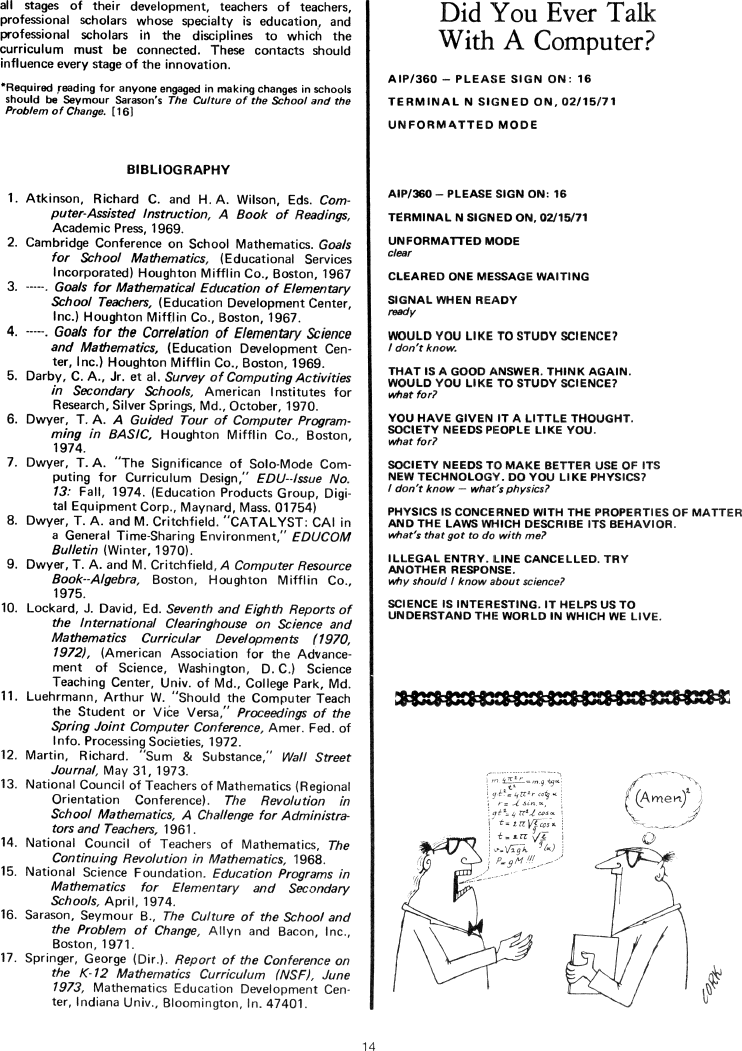The Best of Creative Computing Volume 1 (published 1976)
Recent Trends in Mathematics Curriculum Research

all stages of their development, teachers of teachers, professional scholars
whose specialty is education, and professional scholars in the disciplines to
which the curriculum must be connected. These contacts should influence every
stage of the innovation.
*Required reading for anyone engaged in making changes in schools should be
Seymour Sarason's The Culture of the School and the Problem of Change. [16]
BIBLIOGRAPHY
1. Atkinson, Richard C. and H.A. Wilson, Eds. Computer-Assisted Instruction, A
Book of Readings, Academic Press, 1969.
2. Cambridge Conference on School Mathematics. Goals for School Mathematics,
(Educational Services Incorporated) Houghton Mifflin Co., Boston, 1967
3. -----, Goals for Mathematical Education of Elementary School Teachers,
(Education Development Center, Inc.) Houghton Mifflin Co., Boston, 1967.
4. -----, Goals for the Correlation of Elementary Science and Mathematics,
(Education Development Center, Inc.) Houghton Mifflin Co., Boston, 1969.
5. Darby, C. A., Jr. et al. Survey of Computing Activities in Secondary Schools,
American Institutes for Research, Silver Springs, Md., October, 1970.
6. Dwyer, T. A. A Guided Tour of Computer Programming in BASIC, Houghton Mifflin
Co., Boston, 1974.
7. Dwyer, T. A. "The Significance of Solo-Mode Computing for Curriculum Design,"
EDU--Issue No.13: Fall, 1974. (Education Products Group, Digital Equipment
Corp., Maynard, Mass. 01754)
8. Dwyer, T. A. and M. Critchfield, "CATALYST: CAI in a General Time-Sharing
Environment," EDUCOM Bulletin (Winter, 1970).
9. Dwyer, T. A. and M. Critchfield, A Computer Resource Book--Algebra, Boston,
Houghton Mifflin Co., 1975.
10. Lockard, J. David, Ed. Seventh and Eighth Reports of the International
Clearinghouse on Science and Mathematics Curricular Developments (1970, 1972),
(American Association for the Advancement of Science, Washington, D. C.) Science
Teaching Center, Univ. of Md., College Park, Md.
11. Luehrmann, Arthur W. "Should the Computer Teach the Student or Vice Versa,"
Proceedings of the Spring Joint Computer Conference, Amer. Fed. of Info.
Processing Societies, 1972.
12. Martin, Richard. "Sum & Substance," Wall Street Journal, May 31, 1973.
13. National Council of Teachers of Mathematics (Regional Orientation
Conference). The Revolution in School Mathematics, A Challenge for
Administrators and Teachers, 1961.
14. National Council of Teachers of Mathematics, The Continuing Revolution in
Mathematics, 1968.
15. National Science Foundation. Education Programs in Mathematics for
Elementary and Secondary Schools, April, 1974.
16. Sarason, Seymour B., The Culture of the School and the Problem of Change,
Allyn and Bacon, Inc., Boston, 1971.
17. Springer, George (Dir.). Report of the Conference on the K-12 Mathematics
Curriculum (NSF), June 1973, Mathematics Education Development Center, Indiana
Univ., Bloomington, In. 47401.
****
Did You Ever Talk With A Computer?
AIP/360 - PLEASE SIGN ON: 16
TERMINAL N SIGNED ON, 02/15/71
UNFORMATTED MODE
AIP/360 - PLEASE SIGN ON: 16
TERMINAL N SIGNED ON. 02/15/71
UNFORMATIED MODE
clear
CLEARED ONE MESSAGE WAITING
SIGNAL WHEN READY
ready
WOULD YOU LIKE TO STUDY SCIENCE7
I don't know
THAT IS A GOOD ANSWER. THINK AGAIN.
WOULD YOU LIKE TO STUDY SCIENCE?
what for?
YOU HAVE GIVEN IT A LITTLE THOUGHT.
SOCIETY NEEDS PEOPLE LIKE YOU.
what for?
SOCIETY NEEDS T0 MAKE BETTER USE OF ITS NEW TECHNOLOGY. DO YOU LIKE PHYSICS?
I don't know – what’s physics?
PHYSICS IS CONCERNED WITH THE PROPERTIES OF MATTER AND THE LAWS WHICH DESCRIBE
ITS BEHAVIOR.
what's that gat to do with me?
ILLEGAL ENTRY. LINE CANCELLED. TRY ANOTHER RESPONSE.
why should I know about science?
SCIENCE IS INTERESTING. IT HELPS US TO UNDERSTAND THE WORLD IN WHICH WE LIVE.
[Image]


